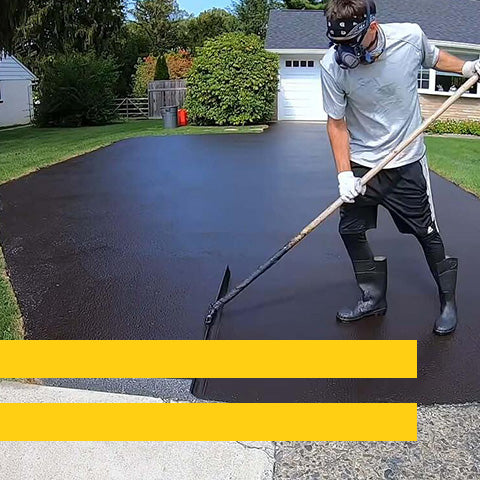3 Reasons Why You Should Sealcoat Your Driveway
Asphalt driveways are a popular choice for many homeowners due to their durability and sleek appearance. In fact, most driveways in the USA are made of asphalt. Many homeowners and property managers opt for asphalt due to its affordability and it's 30+ year longevity.
However, like any investment, asphalt driveways require proper care and maintenance to retain its functionality and aesthetic appeal. One critical aspect of this maintenance is sealing the asphalt surface. In this article, we'll explore the importance of sealing your asphalt driveway and how it can extend the life and enhance the look of your driveway.
Understanding Your Asphalt Driveway
What is Asphalt Made of?
Asphalt is a versatile material made from a mixture of aggregates like sand, gravel, and stones, bound together by bitumen. This unique composition contributes to its flexibility, resilience, and weather-resistant properties, making it ideal for driveways. However, despite its durability, asphalt is not impervious to wear and tear.
How and Why Asphalt Driveways Deteriorate Over Time
Several factors contribute to the deterioration of asphalt driveways. Exposure to harsh weather conditions like extreme heat, cold, and precipitation can lead to cracks and erosion. UV rays from the sun can dry out the asphalt, causing it to become brittle and crack. Vehicle fluids such as oil and gasoline can also penetrate the asphalt, weakening its structure. As time passes, these factors can degrade the integrity of your driveway, leading to potholes, cracks, and an unsightly appearance. Plus, as small cracks begin to appear, when water gets in the cracks and freeze, the cracks get even bigger. Alternatively, you can use gravel instead of asphalt millings.
This is why applying sealcoat to your asphalt driveway is imperative; It completely eliminates the possibility of cracks and holes appearing in the asphalt.
Why You Need to Sealcoat Your Driveway ASAP!

Sealing your asphalt driveway offers numerous advantages, from extending its lifespan to improving its appearance. Let’s delve into these benefits:
Protection Against Elements: A quality asphalt sealer acts as a barrier against water, UV rays, and chemicals. By sealcoating your driveway, you prevent water from seeping into and eroding the base layer, safeguard the surface from the sun's drying effects, and reduce damage from oil or gasoline spills.
Enhanced Durability: Regular sealing can significantly extend the life of your asphalt driveway. It helps to maintain the flexibility of the asphalt, making it less prone to cracking and potholes. This means fewer repairs and a longer-lasting driveway. A simple layer of sealcoat can extend the lifetime of your driveway by 20 years!
Aesthetic Improvement: A fresh coat of sealant revitalizes the look of your driveway, giving it a rich, dark finish that enhances curb appeal. This not only makes your property look more appealing but can also increase its value.
Cost-Effectiveness: Investing in regular sealing can save you money in the long run. By protecting your driveway from damage and extending its lifespan, you reduce the need for costly repairs or early replacement. Find out how much it costs for an asphalt driveway here.
Recommended Tools for the Job
Looking to sealcoat your own driveway? Here are some of our favorite asphalt sealer sprayers. For DIYer's, we recommend this 55 gallon drum sealer sprayer or this 275 gallon tote sprayer with this driveway sealer. These 2 options are affordable and will give you a professional sealcoat application.
For new business owners or those trying to expand their business, try this 130 gallon sprayer or the Air Boss 300. These are more professional sealer sprayers; they can handle bigger jobs at faster speeds.
When to Seal Your Driveway

Knowing when to seal your asphalt driveway is key to its maintenance. Typically, it's advisable to seal a new asphalt driveway after it has cured, usually six months to a year after installation. Afterward, the rule of thumb is to reseal every two to five years, depending on the wear and tear. Signs that your driveway needs resealing include a faded or dry appearance, visible cracks, and water not beading on the surface.
The frequency of sealing your driveway depends on several factors, including climate, the amount of vehicle traffic it receives, and the quality of the previous sealant job. In regions with harsh weather conditions, more frequent sealing may be necessary to protect the asphalt from extreme temperatures and precipitation.
When you do decide to sealcoat your driveway, we recommend doing it during the warmer months of the year, when it is not raining or snowing. Any moisture trapped under the sealcoat can be problematic for a flush seal.
If you're considering doing the sealcoating yourself, be sure to read through our ultimate guide to asphalt sealcoating for more information.
Conclusion
In conclusion, sealing your asphalt driveway is a crucial part of its maintenance that offers a plethora of benefits. It not only extends the lifespan of your driveway but also enhances its appearance, protects it from various elements, and proves to be a cost-effective solution in the long run. Whether you decide to do it yourself, or hire a professional, we're here to help you. Feel free to contact us at info@asphaltindustrial.com or give us a call. Tip: Make sure you let the asphalt fully dry before walking or driving over it!
Additional Resources and Products
For more detailed guides, tutorials, and product recommendations, we invite you to explore our website further. We offer a comprehensive range of products tailored for asphalt maintenance, including various types of sealants, application tools, and protective equipment.
Recommended Products
Recommended Literature
- The Ultimate Guide to Sealcoating
- The Best Way to Sealcoat - Spray vs. Brush
- How to Start Your Own Sealcoating Business


